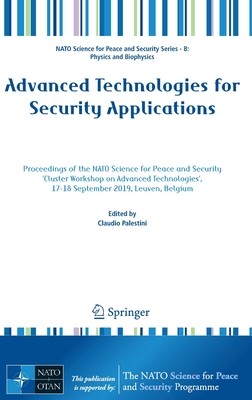
- Išsiųsime per 10–14 d.d.
- Leidėjas: Springer
- ISBN-10: 9402420207
- ISBN-13: 9789402420203
- Formatas: 15.6 x 23.4 x 1.9 cm, kieti viršeliai
- Kalba: Anglų
- Extra -15 % nuolaida šiai knygai su kodu: ENG15
Advanced Technologies for Security Applications + nemokamas atvežimas! | knygos.lt
Atsiliepimai
Aprašymas
Technology has been the spark that ignited NATO's interest and commitment to scientific advancement during its history. Since its creation, the Science for Peace and Security (SPS) Programme has been instrumental to NATO's commitment to innovation, science and technological advancement. During the years, SPS has demonstrated a flexible and versatile approach to practical scientific cooperation, and has promoted knowledge-sharing, building capacity, and projected stability outside NATO territory. The priorities addressed by the SPS Programme are aligned with NATO's strategic objectives, and aim to tackle emerging security challenges that require dynamic adaptation for the prevention and mitigation of risks. By addressing priorities such as advanced technologies, hybrid threats, and counter-terrorism, the Programme deals with new, contemporary challenges. On 17-18 September 2019, the SPS Programme gathered at the KU Leuven University a wide number of researchers from a selection of on-going and recently closed SPS projects in the field of security-related advanced technologies for a "Cluster Workshop on Advanced Technologies". The workshop covered, in particular, the following scientific domains: communication systems, advanced materials, sensors and detectors, and unmanned and autonomous systems. This book provides an overview on how these projects have contributed to the development of new technologies and innovative solutions and recommendations for future actions in the NATO SPS programme.EXTRA 15 % nuolaida su kodu: ENG15
Akcija baigiasi už 5d.10:10:23
Nuolaidos kodas galioja perkant nuo 10 €. Nuolaidos nesumuojamos.

- Leidėjas: Springer
- ISBN-10: 9402420207
- ISBN-13: 9789402420203
- Formatas: 15.6 x 23.4 x 1.9 cm, kieti viršeliai
- Kalba: Anglų




Atsiliepimai